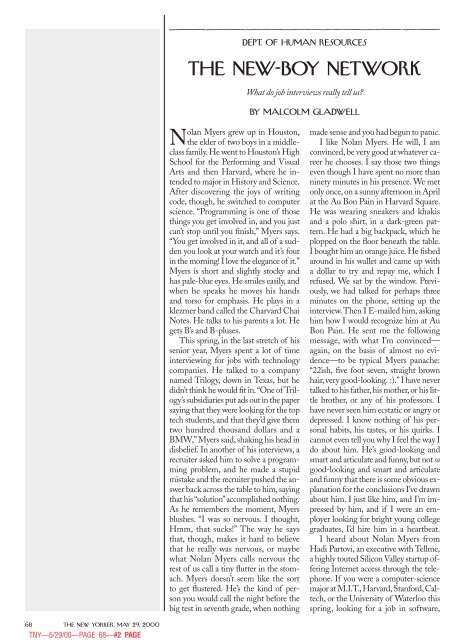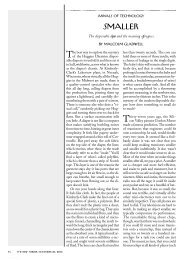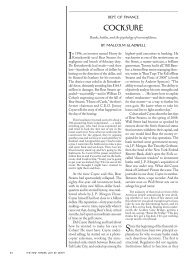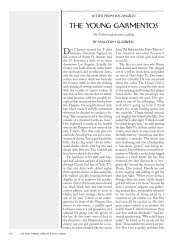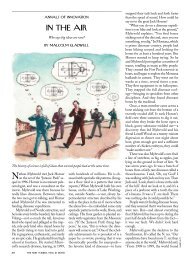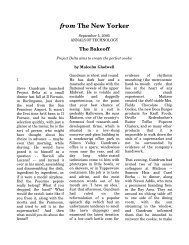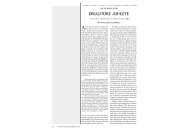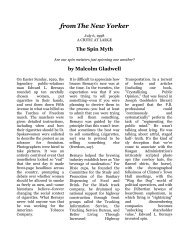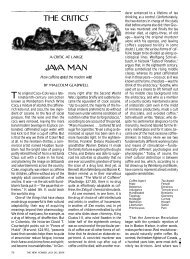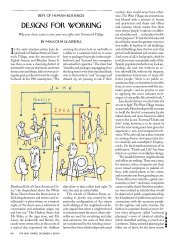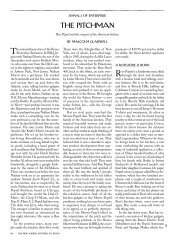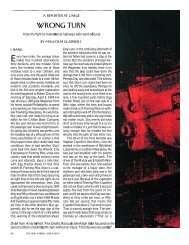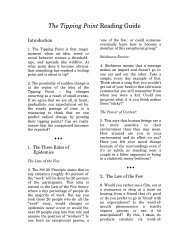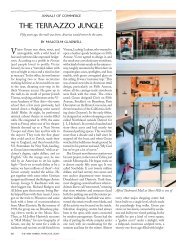The New-Boy Network - Malcolm Gladwell
The New-Boy Network - Malcolm Gladwell
The New-Boy Network - Malcolm Gladwell
You also want an ePaper? Increase the reach of your titles
YUMPU automatically turns print PDFs into web optimized ePapers that Google loves.
68 THE NEW YORKER, MAY 29, 2000<br />
TNY—5/29/00—PAGE 68—#2 PAGE<br />
Nolan Myers grew up in Houston,<br />
the elder of two boys in a middleclass<br />
family. He went to Houston’s High<br />
School for the Performing and Visual<br />
Arts and then Harvard, where he intended<br />
to major in History and Science.<br />
After discovering the joys of writing<br />
code, though, he switched to computer<br />
science. “Programming is one of those<br />
things you get involved in, and you just<br />
can’t stop until you finish,” Myers says.<br />
“You get involved in it, and all of a sudden<br />
you look at your watch and it’s four<br />
in the morning! I love the elegance of it.”<br />
Myers is short and slightly stocky and<br />
has pale-blue eyes. He smiles easily, and<br />
when he speaks he moves his hands<br />
and torso for emphasis. He plays in a<br />
klezmer band called the Charvard Chai<br />
Notes. He talks to his parents a lot. He<br />
gets B’s and B-pluses.<br />
This spring, in the last stretch of his<br />
senior year, Myers spent a lot of time<br />
interviewing for jobs with technology<br />
companies. He talked to a company<br />
named Trilogy, down in Texas, but he<br />
didn’t think he would fit in.“One of Trilogy’s<br />
subsidiaries put ads out in the paper<br />
saying that they were looking for the top<br />
tech students, and that they’d give them<br />
two hundred thousand dollars and a<br />
BMW,” Myers said, shaking his head in<br />
disbelief. In another of his interviews, a<br />
recruiter asked him to solve a programming<br />
problem, and he made a stupid<br />
mistake and the recruiter pushed the answer<br />
back across the table to him, saying<br />
that his “solution” accomplished nothing.<br />
As he remembers the moment, Myers<br />
blushes. “I was so nervous. I thought,<br />
Hmm, that sucks!” <strong>The</strong> way he says<br />
that, though, makes it hard to believe<br />
that he really was nervous, or maybe<br />
what Nolan Myers calls nervous the<br />
rest of us call a tiny flutter in the stomach.<br />
Myers doesn’t seem like the sort<br />
to get flustered. He’s the kind of person<br />
you would call the night before the<br />
big test in seventh grade, when nothing<br />
DEPT. OF HUMAN RESOURCES<br />
THE NEW-BOY NETWORK<br />
What do job interviews really tell us?<br />
BY MALCOLM GLADWELL<br />
made sense and you had begun to panic.<br />
I like Nolan Myers. He will, I am<br />
convinced, be very good at whatever career<br />
he chooses. I say those two things<br />
even though I have spent no more than<br />
ninety minutes in his presence. We met<br />
only once, on a sunny afternoon in April<br />
at the Au Bon Pain in Harvard Square.<br />
He was wearing sneakers and khakis<br />
and a polo shirt, in a dark-green pattern.<br />
He had a big backpack, which he<br />
plopped on the floor beneath the table.<br />
I bought him an orange juice. He fished<br />
around in his wallet and came up with<br />
a dollar to try and repay me, which I<br />
refused. We sat by the window. Previously,<br />
we had talked for perhaps three<br />
minutes on the phone, setting up the<br />
interview.<strong>The</strong>n I E-mailed him, asking<br />
him how I would recognize him at Au<br />
Bon Pain. He sent me the following<br />
message, with what I’m convinced—<br />
again, on the basis of almost no evidence—to<br />
be typical Myers panache:<br />
“22ish, five foot seven, straight brown<br />
hair, very good-looking. :).” I have never<br />
talked to his father, his mother, or his little<br />
brother, or any of his professors. I<br />
have never seen him ecstatic or angry or<br />
depressed. I know nothing of his personal<br />
habits, his tastes, or his quirks. I<br />
cannot even tell you why I feel the way I<br />
do about him. He’s good-looking and<br />
smart and articulate and funny, but not so<br />
good-looking and smart and articulate<br />
and funny that there is some obvious explanation<br />
for the conclusions I’ve drawn<br />
about him. I just like him, and I’m impressed<br />
by him, and if I were an employer<br />
looking for bright young college<br />
graduates, I’d hire him in a heartbeat.<br />
I heard about Nolan Myers from<br />
Hadi Partovi, an executive with Tellme,<br />
a highly touted Silicon Valley startup offering<br />
Internet access through the telephone.<br />
If you were a computer-science<br />
major at M.I.T., Harvard, Stanford, Caltech,<br />
or the University of Waterloo this<br />
spring, looking for a job in software,
GUY BILLOUT Companies use interviews to identify top recruits, but new research raises troubling questions about the power of first impressions.<br />
Tellme was probably at the top of your<br />
list. Partovi and I talked in the conference<br />
room at Tellme’s offices, just off<br />
the soaring, open floor where all the<br />
firm’s programmers and marketers and<br />
executives sit, some of them with bunk<br />
beds built over their desks. (Tellme recently<br />
moved into an old printing plant—<br />
a low-slung office building with a huge<br />
warehouse attached—and,in accordance<br />
with new-economy logic, promptly<br />
turned the old offices into a warehouse<br />
and the old warehouse into offices.) Partovi<br />
is a handsome man of twenty-seven,<br />
with olive skin and short curly black hair,<br />
and throughout our entire interview he<br />
sat with his chair tilted precariously at a<br />
forty-five-degree angle. At the end of a<br />
long riff about how hard it is to find<br />
high-quality people, he blurted out one<br />
name: Nolan Myers. <strong>The</strong>n, from memory,<br />
he rattled off Myers’s telephone<br />
number. He very much wanted Myers to<br />
come to Tellme.<br />
Partovi had met Myers in January,<br />
during a recruiting trip to Harvard. “It<br />
was a heinous day,” Partovi remembers.“I<br />
started at seven and went until nine. I’d<br />
walk one person out and walk the other<br />
in.” <strong>The</strong> first fifteen minutes of every interview<br />
he spent talking about Tellme—<br />
its strategy, its goals, and its business.<br />
<strong>The</strong>n he gave everyone a short programming<br />
puzzle. For the rest of the hourlong<br />
meeting, Partovi asked questions.<br />
He remembers that Myers did well on<br />
the programming test, and after talking<br />
to him for thirty to forty minutes he be-<br />
TNY—5/29/00—PAGE 69—LIVE OPI ART—R7795—133SC.<br />
came convinced that Myers had, as he<br />
puts it, “the right stuff.” Partovi spent<br />
even less time with Myers than I did. He<br />
didn’t talk to Myers’s family, or see him<br />
ecstatic or angry or depressed, either. He<br />
knew that Myers had spent last summer<br />
as an intern at Microsoft and was about<br />
to graduate from an Ivy League school.<br />
But virtually everyone recruited by a<br />
place like Tellme has graduated from<br />
an élite university, and the Microsoft<br />
summer-internship program has more<br />
than six hundred people in it. Partovi<br />
didn’t even know why he liked Myers so<br />
much. He just did. “It was very much a<br />
gut call,” he says.<br />
This wasn’t so very different from the<br />
experience Nolan Myers had with Steve<br />
Ballmer, the C.E.O. of Microsoft. Ear-<br />
lier this year, Myers attended a party for<br />
former Microsoft interns called Gradbash.<br />
Ballmer gave a speech there, and at<br />
the end of his remarks Myers raised his<br />
hand. “He was talking a lot about aligning<br />
the company in certain directions,”<br />
Myers told me, “and I asked him about<br />
how that influences his ability to make<br />
bets on other directions. Are they still<br />
going to make small bets?” Afterward, a<br />
Microsoft recruiter came up to Myers<br />
and said, “Steve wants your E-mail address.”<br />
Myers gave it to him, and soon he<br />
and Ballmer were E-mailing. Ballmer,<br />
it seems, badly wanted Myers to come<br />
to Microsoft. “He did research on me,”<br />
Myers says. “He knew which group<br />
I was interviewing with, and knew a<br />
lot about me personally. He sent me an<br />
E-mail saying that he’d love to have<br />
me come to Microsoft, and if I had any<br />
questions I should contact him. So I sent<br />
him a response, saying thank you. After<br />
I visited Tellme, I sent him an E-mail<br />
saying I was interested in Tellme, here<br />
were the reasons, that I wasn’t sure yet,<br />
and if he had anything to say I said I’d<br />
love to talk to him. I gave him my number.<br />
So he called, and after playing phone<br />
tag we talked—about career trajectory,<br />
how Microsoft would influence my career,<br />
what he thought of Tellme. I was<br />
extremely impressed with him, and he<br />
seemed very genuinely interested in me.”<br />
What convinced Ballmer he wanted<br />
Myers? A glimpse! He caught a little<br />
slice of Nolan Myers in action and—<br />
just like that—the C.E.O. of a four-<br />
hundred-billion-dollar company was<br />
calling a college senior in his dorm room.<br />
Ballmer somehow knew he liked Myers,<br />
the same way Hadi Partovi knew, and<br />
the same way I knew after our little chat<br />
at Au Bon Pain. But what did we know?<br />
What could we know? By any reasonable<br />
measure, surely none of us knew<br />
Nolan Myers at all.<br />
It is a truism of the new economy<br />
that the ultimate success of any enterprise<br />
lies with the quality of the people it<br />
hires. At many technology companies,<br />
employees are asked to all but live at the<br />
office, in conditions of intimacy that<br />
would have been unthinkable a generation<br />
ago. <strong>The</strong> artifacts of the prototypical<br />
Silicon Valley office—the videogames,<br />
the espresso bar, the bunk beds,<br />
THE NEW YORKER, MAY 29, 2000 69
the basketball hoops—are the elements<br />
of the rec room, not the workplace. And<br />
in the rec room you want to play only<br />
with your friends. But how do you find<br />
out who your friends are? Today, recruiters<br />
canvas the country for résumés.<br />
<strong>The</strong>y analyze employment histories and<br />
their competitors’ staff listings.<strong>The</strong>y call<br />
references, and then do what I did with<br />
Nolan Myers: sit down with a perfect<br />
stranger for an hour and a half and attempt<br />
to draw conclusions about that<br />
stranger’s intelligence and personality.<br />
<strong>The</strong> job interview has become one of<br />
the central conventions of the modern<br />
economy. But what, exactly, can you<br />
know about a stranger after sitting down<br />
and talking with him for an hour?<br />
Some years ago, an experimental<br />
psychologist at Harvard University,<br />
Nalini Ambady, together with Robert<br />
Rosenthal, set out to examine the nonverbal<br />
aspects of good teaching. As the<br />
basis of her research, she used videotapes<br />
of teaching fellows which had<br />
been made during a training program at<br />
Harvard. Her plan was to have outside<br />
observers look at the tapes with the<br />
sound off and rate the effectiveness of<br />
the teachers by their expressions and<br />
physical cues. Ambady wanted to have at<br />
least a minute of film to work with.<br />
When she looked at the tapes, though,<br />
there was really only about ten seconds<br />
when the teachers were shown apart<br />
from the students. “I didn’t want students<br />
in the frame, because obviously it<br />
would bias the ratings,” Ambady says.<br />
“So I went to my adviser, and I said,<br />
‘This isn’t going to work.’ ”<br />
But it did. <strong>The</strong> observers, presented<br />
with a ten-second silent video clip,<br />
had no difficulty rating the teachers on<br />
a fifteen-item checklist of personality<br />
traits. In fact, when Ambady cut the<br />
clips back to five seconds, the ratings<br />
were the same.<strong>The</strong>y were even the same<br />
when she showed her raters just two<br />
seconds of videotape. That sounds unbelievable<br />
unless you actually watch<br />
Ambady’s teacher clips, as I did, and<br />
realize that the eight seconds that distinguish<br />
the longest clips from the shortest<br />
are superfluous: anything beyond<br />
the first flash of insight is unnecessary.<br />
When we make a snap judgment, it<br />
really is made in a snap. It’s also, very<br />
clearly, a judgment: we get a feeling<br />
70 THE NEW YORKER, MAY 29, 2000<br />
TNY—5/29/00—PAGE 70<br />
y 4x<br />
IF =<br />
, THEN<br />
3 + x 2 -- 12<br />
2x 2 x<br />
-- 9<br />
you are standing at the ocean,<br />
in the moon’s empirical light<br />
each mercurial wave<br />
like a parabola shifting on its axis,<br />
the sea’s dunes differentiated & graphed.<br />
If this, then that.<strong>The</strong> poet<br />
laughs. She wants to lie<br />
in her own equation, the point slope<br />
like a woman whispering stay me<br />
with flagons. What is it to know the absolute value<br />
of negative grace, to calculate<br />
how the heart becomes the empty set<br />
unintersectable, the first & the last?<br />
But enough.<br />
You are standing on the shore,<br />
the parameters like wooden stakes.<br />
Let x be the moon like a notary.<br />
Let y be all things left unsaid.<br />
Let the constant be the gold earth<br />
waiting to envelop what remains,<br />
the sieves of the lungs like two cones.<br />
that we have no difficulty articulating.<br />
Ambady’s next step led to an even<br />
more remarkable conclusion. She compared<br />
those snap judgments of teacher<br />
effectiveness with evaluations made,<br />
after a full semester of classes, by students<br />
of the same teachers.<strong>The</strong> correlation<br />
between the two, she found, was<br />
astoundingly high. A person watching<br />
a two-second silent video clip of a<br />
teacher he has never met will reach conclusions<br />
about how good that teacher<br />
is that are very similar to those of a student<br />
who sits in the teacher’s class for an<br />
entire semester.<br />
Recently, a comparable experiment<br />
was conducted by Frank Bernieri, a psychologist<br />
at the University of Toledo.<br />
Bernieri, working with one of his graduate<br />
students, Neha Gada-Jain, selected<br />
two people to act as interviewers, and<br />
trained them for six weeks in the proper<br />
procedures and techniques of giving an<br />
—Amy Quan Barry<br />
effective job interview. <strong>The</strong> two then<br />
interviewed ninety-eight volunteers, of<br />
various ages and backgrounds.<strong>The</strong> interviews<br />
lasted between fifteen and twenty<br />
minutes, and afterward each interviewer<br />
filled out a six-page, five-part evaluation<br />
of the person he’d just talked to. Originally,<br />
the intention of the study was to<br />
find out whether applicants who had<br />
been coached in certain nonverbal behaviors<br />
designed to ingratiate themselves<br />
with their interviewers—like mimicking<br />
the interviewers’ physical gestures or<br />
posture—would get better ratings than<br />
applicants who behaved normally. As it<br />
turns out, they didn’t. But then another<br />
of Bernieri’s students, an undergraduate<br />
named Tricia Prickett, decided that she<br />
wanted to use the interview videotapes<br />
and the evaluations that had been collected<br />
to test out the adage that “the<br />
handshake is everything.”<br />
“She took fifteen seconds of videotape
showing the applicant as he or she knocks<br />
on the door, comes in, shakes the hand of<br />
the interviewer, sits down, and the interviewer<br />
welcomes the person,” Bernieri<br />
explained. <strong>The</strong>n, like Ambady, Prickett<br />
got a series of strangers to rate the applicants<br />
based on the handshake clip, using<br />
the same criteria that the interviewers<br />
had used. Once more, against all expectations,<br />
the ratings were very similar to<br />
those of the interviewers. “On nine out<br />
of the eleven traits the applicants were<br />
being judged on, the observers significantly<br />
predicted the outcome of the interview,”<br />
Bernieri says. “<strong>The</strong> strength of<br />
the correlations was extraordinary.”<br />
This research takes Ambady’s conclusions<br />
one step further. In the Toledo<br />
experiment, the interviewers were<br />
trained in the art of interviewing. <strong>The</strong>y<br />
weren’t dashing off a teacher evaluation<br />
on their way out the door.<strong>The</strong>y were filling<br />
out a formal, detailed questionnaire,<br />
of the sort designed to give the most<br />
thorough and unbiased account of an<br />
interview. And still their ratings weren’t<br />
TNY—5/29/00—PAGE 71<br />
all that different from those of people<br />
off the street who saw just the greeting.<br />
This is why Hadi Partovi, Steve Ballmer,<br />
and I all agreed on Nolan Myers.<br />
Apparently, human beings don’t need to<br />
know someone in order to believe that<br />
they know someone. Nor does it make<br />
that much difference, apparently, that<br />
Partovi reached his conclusion after<br />
putting Myers through the wringer for<br />
an hour, I reached mine after ninety<br />
minutes of amiable conversation at Au<br />
Bon Pain, and Ballmer reached his after<br />
watching and listening as Myers<br />
asked a question.<br />
Bernieri and Ambady believe that<br />
the power of first impressions suggests<br />
that human beings have a particular<br />
kind of prerational ability for making<br />
searching judgments about others. In<br />
Ambady’s teacher experiments, when<br />
she asked her observers to perform a<br />
potentially distracting cognitive task—<br />
like memorizing a set of numbers—<br />
while watching the tapes, their judgments<br />
of teacher effectiveness were un-<br />
changed. But when she instructed her<br />
observers to think hard about their ratings<br />
before they made them, their accuracy<br />
suffered substantially. Thinking<br />
only gets in the way. “<strong>The</strong> brain structures<br />
that are involved here are very<br />
primitive,” Ambady speculates. “All of<br />
these affective reactions are probably<br />
governed by the lower brain structures.”<br />
What we are picking up in that first instant<br />
would seem to be something quite<br />
basic about a person’s character, because<br />
what we conclude after two seconds is<br />
pretty much the same as what we conclude<br />
after twenty minutes or, indeed,<br />
an entire semester. “Maybe you can tell<br />
immediately whether someone is extroverted,<br />
or gauge the person’s ability to<br />
communicate,” Bernieri says. “Maybe<br />
these clues or cues are immediately accessible<br />
and apparent.” Bernieri and<br />
Ambady are talking about the existence<br />
of a powerful form of human intuition.<br />
In a way, that’s comforting, because it<br />
suggests that we can meet a perfect<br />
stranger and immediately pick up on<br />
THE NEW YORKER, MAY 29, 2000 71
something important about him. It<br />
means that I shouldn’t be concerned<br />
that I can’t explain why I like Nolan<br />
Myers, because, if such judgments are<br />
made without thinking, then surely they<br />
defy explanation.<br />
But there’s a troubling suggestion<br />
here as well. I believe that Nolan Myers<br />
is an accomplished and likable person.<br />
But I have no idea from our brief encounter<br />
how honest he is, or whether he<br />
is self-centered, or whether he works<br />
best by himself or in a group, or any<br />
number of other fundamental traits.<br />
That people who simply see the handshake<br />
arrive at the same conclusions as<br />
people who conduct a full interview also<br />
implies, perhaps, that those initial impressions<br />
matter too much—that they<br />
color all the other impressions that we<br />
gather over time.<br />
For example, I asked Myers if he felt<br />
nervous about the prospect of leaving<br />
school for the workplace, which seemed<br />
like a reasonable question, since I remember<br />
how anxious I was before my<br />
first job. Would the hours scare him?<br />
Oh no, he replied, he was already working<br />
between eighty and a hundred hours<br />
a week at school. “Are there things that<br />
you think you aren’t good at, which<br />
make you worry?” I continued.<br />
His reply was sharp:“Are there things<br />
that I’m not good at, or things that I<br />
can’t learn? I think that’s the real question.<br />
<strong>The</strong>re are a lot of things I don’t<br />
know anything about, but I feel comfortable<br />
that given the right environment<br />
and the right encouragement I<br />
can do well at.” In my notes, next to that<br />
reply, I wrote “Great answer!” and I can<br />
remember at the time feeling the little<br />
thrill you experience as an interviewer<br />
when someone’s behavior conforms<br />
with your expectations. Because I had<br />
decided, right off, that I liked him, what<br />
I heard in his answer was toughness and<br />
confidence. Had I decided early on that<br />
I didn’t like Nolan Myers, I would have<br />
heard in that reply arrogance and bluster.<strong>The</strong><br />
first impression becomes a selffulfilling<br />
prophecy: we hear what we expect<br />
to hear.<strong>The</strong> interview is hopelessly<br />
biased in favor of the nice.<br />
When Ballmer and Partovi and<br />
I met Nolan Myers, we made<br />
a prediction. We looked at the way he<br />
behaved in our presence—at the way<br />
72 THE NEW YORKER, MAY 29, 2000<br />
TNY—5/29/00—PAGE 72—ART LIVE SPOT—N20247—120 LS<br />
he talked and acted and seemed to<br />
think—and drew conclusions about<br />
how he would behave in other situations.<br />
I had decided, remember, that<br />
Myers was the kind of person you called<br />
the night before the big test in seventh<br />
grade. Was I right to make that kind<br />
of generalization?<br />
This is a question that social psychologists<br />
have looked at closely. In<br />
the late nineteen-twenties, in a famous<br />
study, the psychologist <strong>The</strong>odore <strong>New</strong>comb<br />
analyzed extroversion among<br />
adolescent boys at a summer camp. He<br />
found that how talkative a boy was<br />
in one setting—say, lunch—was highly<br />
predictive of how talkative that boy<br />
would be in the same setting in the future.<br />
A boy who was curious at lunch<br />
on Monday was likely to be curious<br />
at lunch on Tuesday. But his behavior<br />
in one setting told you almost nothing<br />
about how he would behave in a<br />
different setting: from how someone<br />
behaved at lunch, you couldn’t predict<br />
how he would behave during, say, afternoon<br />
playtime. In a more recent study,<br />
of conscientiousness among students<br />
at Carleton College, the researchers Walter<br />
Mischel, Neil Lutsky, and Philip K.<br />
Peake showed that how neat a student’s<br />
assignments were or how punctual he<br />
was told you almost nothing about how<br />
often he attended class or how neat his<br />
room or his personal appearance was.<br />
How we behave at any one time, evidently,<br />
has less to do with some immutable<br />
inner compass than with the<br />
particulars of our situation.<br />
This conclusion, obviously, is at odds<br />
with our intuition. Most of the time,<br />
we assume that people display the same<br />
character traits in different situations.<br />
We habitually underestimate the large<br />
role that context plays in people’s behavior.<br />
In the <strong>New</strong>comb summer-camp<br />
experiment, for example, the results<br />
showing how little consistency there<br />
was from one setting to another in<br />
talkativeness, curiosity, and gregariousness<br />
were tabulated from observations<br />
made and recorded by camp counsellors<br />
on the spot. But when, at the end<br />
of the summer, those same counsellors<br />
were asked to give their final impressions<br />
of the kids, they remembered<br />
the children’s behavior as being highly<br />
consistent.<br />
“<strong>The</strong> basis of the illusion is that we<br />
are somehow confident that we are getting<br />
what is there, that we are able to<br />
read off a person’s disposition,” Richard<br />
Nisbett, a psychologist at the University<br />
of Michigan, says.“When you have<br />
an interview with someone and have<br />
an hour with them, you don’t conceptualize<br />
that as taking a sample of a person’s<br />
behavior, let alone a possibly biased<br />
sample, which is what it is. What<br />
you think is that you are seeing a hologram,<br />
a small and fuzzy image but still<br />
the whole person.”<br />
<strong>The</strong>n Nisbett mentioned his frequent<br />
collaborator, Lee Ross, who<br />
teaches psychology at Stanford.“<strong>The</strong>re<br />
was one term when he was teaching<br />
statistics and one term he was teaching<br />
a course with a lot of humanistic<br />
psychology. He gets his teacher evaluations.<br />
<strong>The</strong> first referred to him as cold,<br />
rigid, remote, finicky, and uptight. And<br />
the second described this wonderful<br />
warmhearted guy who was so deeply<br />
concerned with questions of community<br />
and getting students to grow. It<br />
was Jekyll and Hyde. In both cases, the<br />
students thought they were seeing the<br />
real Lee Ross.”<br />
Psychologists call this tendency—<br />
to fixate on supposedly stable character<br />
traits and overlook the influence<br />
of context—the Fundamental Attribution<br />
Error, and if you combine this<br />
error with what we know about snap<br />
judgments the interview becomes an<br />
even more problematic encounter. Not<br />
only had I let my first impressions color<br />
the information I gathered about Myers,<br />
but I had also assumed that the way<br />
he behaved with me in an interview<br />
setting was indicative of the way he<br />
would always behave. It isn’t that the<br />
interview is useless; what I learned<br />
about Myers—that he and I get along<br />
well—is something I could never have<br />
got from a résumé or by talking to<br />
his references. It’s just that our conversation<br />
turns out to have been less<br />
useful, and potentially more misleading,<br />
than I had supposed. That most
“I’ve forgotten what I want to be remembered for.”<br />
basic of human rituals—the conversation<br />
with a stranger—turns out to be<br />
a minefield.<br />
Not long after I met with Nolan<br />
Myers, I talked with a humanresources<br />
consultant from Pasadena<br />
named Justin Menkes. Menkes’s job is<br />
to figure out how to extract meaning<br />
from face-to-face encounters, and with<br />
that in mind he agreed to spend an hour<br />
interviewing me the way he thinks interviewing<br />
ought to be done. It felt,<br />
going in, not unlike a visit to a shrink,<br />
except that instead of having months,<br />
if not years, to work things out, Menkes<br />
was set upon stripping away my secrets<br />
in one session.<br />
Consider, he told me, a commonly<br />
asked question like “Describe a few situations<br />
in which your work was criticized.<br />
How did you handle the criticism?”<br />
<strong>The</strong> problem, Menkes said, is<br />
that it’s much too obvious what the interviewee<br />
is supposed to say. “<strong>The</strong>re was<br />
a situation where I was working on a<br />
project, and I didn’t do as well as I could<br />
have,” he said, adopting a mock-sincere<br />
84 THE NEW YORKER, MAY 29, 2000<br />
• •<br />
TNY—5/29/00—PAGE 84—LIVE OPI ART #A3970—120 LS.<br />
singsong. “My boss gave me some<br />
constructive criticism. And I redid the<br />
project. It hurt. Yet we worked it out.”<br />
<strong>The</strong> same is true of the question “What<br />
would your friends say about you?”—<br />
to which the correct answer (preferably<br />
preceded by a pause, as if to suggest<br />
that it had never dawned on you that<br />
someone would ask such a question)<br />
is “My guess is that they would call<br />
me a people person—either that or a<br />
hard worker.”<br />
Myers and I had talked about obvious<br />
questions, too.“What is your greatest<br />
weakness?” I asked him. He answered,<br />
“I tried to work on a project my<br />
freshman year, a children’s festival. I was<br />
trying to start a festival as a benefit here<br />
in Boston. And I had a number of guys<br />
working with me. I started getting concerned<br />
with the scope of the project we<br />
were working on—how much responsibility<br />
we had, getting things done. I really<br />
put the brakes on, but in retrospect<br />
I really think we could have done it and<br />
done a great job.”<br />
<strong>The</strong>n Myers grinned and said, as an<br />
aside, “Do I truly think that is a fault?<br />
Honestly, no.” And, of course, he’s right.<br />
All I’d really asked him was whether he<br />
could describe a personal strength as if<br />
it were a weakness, and, in answering<br />
as he did, he had merely demonstrated<br />
his knowledge of the unwritten rules of<br />
the interview.<br />
But, Menkes said, what if those<br />
questions were rephrased so that the answers<br />
weren’t obvious? For example:“At<br />
your weekly team meetings, your boss<br />
unexpectedly begins aggressively critiquing<br />
your performance on a current<br />
project. What do you do?”<br />
I felt a twinge of anxiety. What<br />
would I do? I remembered a terrible<br />
boss I’d had years ago. “I’d probably<br />
be upset,” I said. “But I doubt I’d say<br />
anything. I’d probably just walk away.”<br />
Menkes gave no indication whether<br />
he was concerned or pleased by that<br />
answer. He simply pointed out that another<br />
person might well have said something<br />
like “I’d go and see my boss later<br />
in private, and confront him about<br />
why he embarrassed me in front of my<br />
team.” I was saying that I would probably<br />
handle criticism—even inappropriate<br />
criticism—from a superior with<br />
stoicism; in the second case, the applicant<br />
was saying he or she would adopt<br />
a more confrontational style. Or, at<br />
least, we were telling the interviewer<br />
that the workplace demands either stoicism<br />
or confrontation—and to Menkes<br />
these are revealing and pertinent pieces<br />
of information.<br />
Menkes moved on to another area—<br />
handling stress. A typical question in<br />
this area is something like “Tell me<br />
about a time when you had to do several<br />
things at once. How did you handle the<br />
situation? How did you decide what to<br />
do first?” Menkes says this is also too<br />
easy. “I just had to be very organized,”<br />
he began again in his mock-sincere<br />
singsong. “I had to multitask. I had<br />
to prioritize and delegate appropriately.<br />
I checked in frequently with my boss.”<br />
Here’s how Menkes rephrased it:“You’re<br />
in a situation where you have two very<br />
important responsibilities that both<br />
have a deadline that is impossible to<br />
meet.You cannot accomplish both. How<br />
do you handle that situation?”<br />
“Well,” I said, “I would look at the<br />
two and decide what I was best at, and<br />
then go to my boss and say, ‘It’s better<br />
that I do one well than both poorly,’ and
we’d figure out who else could do the<br />
other task.”<br />
Menkes immediately seized on a<br />
telling detail in my answer. I was interested<br />
in what job I would do best.<br />
But isn’t the key issue what job the company<br />
most needed to have done? With<br />
that comment, I had revealed something<br />
valuable: that in a time of workrelated<br />
crisis I start from a self-centered<br />
consideration. “Perhaps you are a bit of<br />
a solo practitioner,” Menkes said diplomatically.<br />
“That’s an essential bit of<br />
information.”<br />
Menkes deliberately wasn’t drawing<br />
any broad conclusions. If we are<br />
not people who are shy or talkative or<br />
outspoken but people who are shy in<br />
some contexts, talkative in other situations,<br />
and outspoken in still other areas,<br />
then what it means to know someone<br />
is to catalogue and appreciate all those<br />
variations. Menkes was trying to begin<br />
that process of cataloguing. This interviewing<br />
technique is known as “structured<br />
interviewing,” and in studies by<br />
industrial psychologists it has been<br />
shown to be the only kind of interviewing<br />
that has any success at all in predicting<br />
performance in the workplace.<br />
In the structured interviews, the format<br />
is fairly rigid. Each applicant is treated<br />
in precisely the same manner.<strong>The</strong> questions<br />
are scripted. <strong>The</strong> interviewers are<br />
carefully trained, and each applicant<br />
is rated on a series of predetermined<br />
scales.<br />
What is interesting about the structured<br />
interview is how narrow its objectives<br />
are. When I interviewed Nolan<br />
Myers I was groping for some kind of<br />
global sense of who he was; Menkes<br />
seemed entirely uninterested in arriving<br />
at that same general sense of me—he<br />
seemed to realize how foolish that expectation<br />
was for an hour-long interview.<br />
<strong>The</strong> structured interview works<br />
precisely because it isn’t really an interview;<br />
it isn’t about getting to know<br />
someone, in a traditional sense. It’s as<br />
much concerned with rejecting information<br />
as it is with collecting it.<br />
Not surprisingly, interview specialists<br />
have found it extraordinarily difficult to<br />
persuade most employers to adopt the<br />
structured interview. It just doesn’t feel<br />
right. For most of us, hiring someone is<br />
essentially a romantic process, in which<br />
the job interview functions as a desexu-<br />
86 THE NEW YORKER, MAY 29, 2000<br />
TNY—5/29/00—PAGE 86—#2<br />
alized version of a date. We are looking<br />
for someone with whom we have a certain<br />
chemistry, even if the coupling that<br />
results ends in tears and the pursuer<br />
and the pursued turn out to have nothing<br />
in common. We want the unlimited<br />
promise of a love affair. <strong>The</strong> structured<br />
interview, by contrast, seems to offer<br />
only the dry logic and practicality of an<br />
arranged marriage.<br />
Nolan Myers agonized over which<br />
job to take. He spent half an hour<br />
on the phone with Steve Ballmer, and<br />
Ballmer was very persuasive. “He gave<br />
me very, very good advice,” Myers says<br />
of his conversations with the Microsoft<br />
C.E.O. “He felt that I should go<br />
to the place that excited me the most<br />
and that I thought would be best for<br />
my career. He offered to be my mentor.”<br />
Myers says he talked to his parents<br />
every day about what to do. In February,<br />
he flew out to California and<br />
spent a Saturday going from one Tellme<br />
executive to another, asking and answering<br />
questions. “Basically, I had three<br />
things I was looking for. One was longterm<br />
goals for the company. Where did<br />
they see themselves in five years? Second,<br />
what position would I be playing in<br />
the company?” He stopped and burst<br />
out laughing. “And I forget what the<br />
third one is.” In March, Myers committed<br />
to Tellme.<br />
Will Nolan Myers succeed at Tellme?<br />
I think so, although I honestly have no<br />
idea. It’s a harder question to answer<br />
now than it would have been thirty or<br />
forty years ago. If this were 1965, Nolan<br />
Myers would have gone to work at<br />
I.B.M. and worn a blue suit and sat in a<br />
small office and kept his head down,<br />
and the particulars of his personality<br />
would not have mattered so much. It<br />
was not so important that I.B.M. understood<br />
who you were before it hired<br />
you, because you understood what<br />
I.B.M. was. If you walked through the<br />
door at Armonk or at a branch office in<br />
Illinois, you knew what you had to be<br />
and how you were supposed to act. But<br />
to walk through the soaring, open offices<br />
of Tellme, with the bunk beds over<br />
the desks, is to be struck by how much<br />
more demanding the culture of Silicon<br />
Valley is. Nolan Myers will not be provided<br />
with a social script, that blue suit<br />
and organization chart.Tellme, like any<br />
technology startup these days, wants its<br />
employees to be part of a fluid team, to<br />
be flexible and innovative, to work with<br />
shifting groups in the absence of hierarchy<br />
and bureaucracy, and in that environment,<br />
where the workplace doubles<br />
as the rec room, the particulars of your<br />
personality matter a great deal.<br />
This is part of the new economy’s<br />
appeal, because Tellme’s soaring warehouse<br />
is a more productive and enjoyable<br />
place to work than the little office<br />
boxes of the old I.B.M. But the danger<br />
here is that we will be led astray in judging<br />
these newly important particulars<br />
of character. If we let personability—<br />
some indefinable, prerational intuition,<br />
magnified by the Fundamental Attribution<br />
Error—bias the hiring process<br />
today, then all we will have done is replace<br />
the old-boy network, where you<br />
hired your nephew, with the new-boy<br />
network, where you hire whoever impressed<br />
you most when you shook his<br />
hand. Social progress, unless we’re careful,<br />
can merely be the means by which<br />
we replace the obviously arbitrary with<br />
the not so obviously arbitrary.<br />
Myers has spent much of the past<br />
year helping to teach Introduction to<br />
Computer Science. He realized, he says,<br />
that one of the reasons that students<br />
were taking the course was that they<br />
wanted to get jobs in the software industry.<br />
“I decided that, having gone<br />
through all this interviewing, I had developed<br />
some expertise, and I would<br />
like to share that.<strong>The</strong>re is a real skill and<br />
art in presenting yourself to potential<br />
employers. And so what we did in this<br />
class was talk about the kinds of things<br />
that employers are looking for—what<br />
are they looking for in terms of personality.<br />
One of the most important<br />
things is that you have to come across<br />
as being confident in what you are doing<br />
and in who you are. How do you do<br />
that? Speak clearly and smile.” As he<br />
said that, Nolan Myers smiled. “For a<br />
lot of people, that’s a very hard skill<br />
to learn. But for some reason I seem<br />
to understand it intuitively.” ♦<br />
1<br />
From the Bethel (Maine) Citizen.<br />
Mel Culpa, Mel Culpa, Mel Culpa: for<br />
those of you who aren’t Catholic or who<br />
don’t speak Latin, that means I’m sorry,<br />
sorry, sorry about last week’s non column.<br />
Not half as sorry as Mel.


